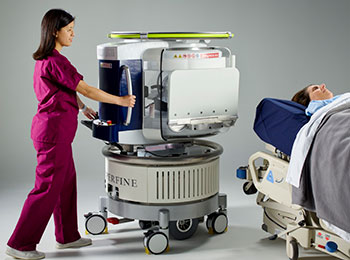UCI Medical Center becomes first West Coast hospital to use portable MRI technology
New technology brings MRI to the bedside of patients in critical condition

Unlike traditional MRIs, the new system can take images of critically ill patients in hospital rooms and ICUs where metal objects are commonplace. Photo from Hyperfine Research
Orange, Calif. — UCI Medical Center is the first hospital on the West Coast to offer the Swoop™ Portable MRI System, which can be wheeled to the bedsides of patients in critical condition.
The portable magnetic resonance imaging device enables clinicians at Orange County's only Level I trauma center to take neurological images of critically ill patients in the emergency department and intensive care units with less movement, shorter wait times and results that are comparable to standard MRI scanners.
“Critical care patients in the ICU can be difficult to transport for a traditional MRI because they are intubated or connected to life-support equipment,” says vascular neurologist Dr. Wengui Yu, director of the UCI Health Comprehensive Stroke and Cerebrovascular Center. “The portable MRI makes imaging faster and easier for our hospitalized COVID-19 patients and for those who have experienced stroke or a brain injury, where every minute counts.”
UCI Health is among the nation's earliest adopters of Hyperfine Research's new imaging system, which was cleared by the FDA last summer. Unlike traditional MRIs, Swoop™ was designed with technology that is usable in intensive care units and other hospital rooms where metal objects are common, making the experience more convenient for patients and clinicians.
“As Orange County’s only academic medical center and Level I trauma center, UCI Medical Center is committed to using the latest technology to improve the patient care experience,” says Chad Lefteris, CEO of UCI Health. “Our community expects UCI Health to provide the highest level of acute care for critical emergencies such as stroke. Portable MRI technology helps us achieve this.”
Bedside imaging capability is vitally important for the most severely ill patients, says Dr. Chris Fox, chief of Emergency Medical Services at UCI Health and chair of the Department of Emergency Medicine at the UCI School of Medicine.
“We are able to scan a wider array of patients who would otherwise need to wait until they are stable enough for transportation to the MRI scanner,” says Fox. “By bringing the MRI to the point of care, patients benefit from faster diagnoses and improved outcomes.”
For more information, contact:
John Murray
310-433-8809
jdmurray@uci.edu
UCI Health System is the clinical enterprise of the University of California, Irvine. Patients can access UCI Health at primary and specialty care offices across Orange County and at its main campus, UCI Medical Center in Orange, Calif. The 418-bed acute-care hospital, listed among America’s Best Hospitals by U.S. News & World Report for 20 consecutive years, provides tertiary and quaternary care, ambulatory and specialty medical clinics, as well as behavioral health and rehabilitation services. UCI Medical Center is home to Orange County’s only National Cancer Institute-designated comprehensive cancer center, high-risk perinatal/neonatal program and American College of Surgeons-verified Level I adult and Level II pediatric trauma center and regional burn center. It is the primary teaching hospital for the UCI School of Medicine. UCI Health serves a region of nearly 4 million people in Orange County, western Riverside County and southeast Los Angeles County. Follow us on Facebook and Twitter.




